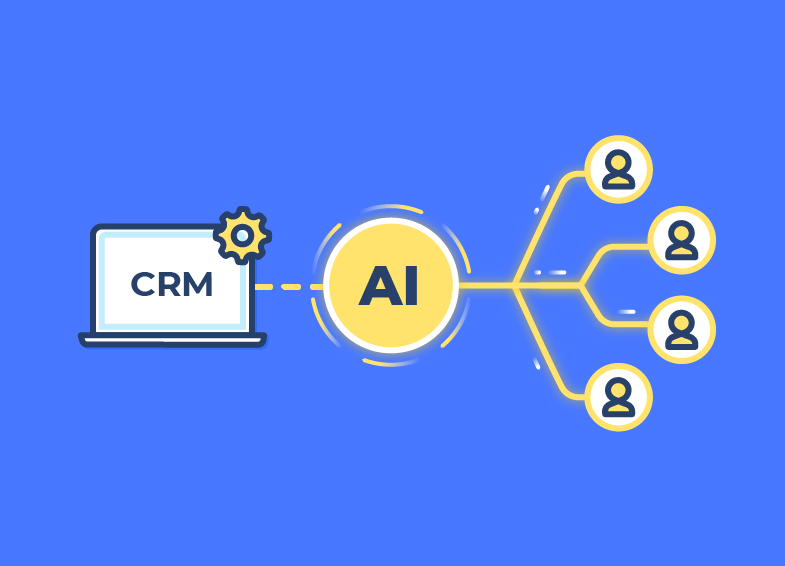AI, the booster of an intelligent CRM strategy



Sandra Fernandes
Category: AI for CRM
At the heart of CRM is data. Companies now have access to huge volumes of customer data, but few of them manage to take full advantage of it. AI will enable companies to process very large volumes of customer data in order to exploit its potential and transform it into intelligent actions.
Let's see howAI has the power to transform your strategy and multiply the impact of your CRM actions tenfold.
Analyzing and leveraging this customer data with AI offers considerable competitive advantages for brands. Elaborate scorings, classification of products according to their performance, understanding of customer preferences, analysis of purchases, integration of social network listening... analysis and understanding capabilities are increased. The use of AI makes it possible to make the most of all the information collected.
By crossing multiple types of data, you can intelligently segment your customer base and even create new segments.
AI allows you to assess the real value of each customer. Using the data collected and the analytical power of AI, you will be able to identify relevant KPIs:
AI is capable of scanning and deconstructing large volumes of customer data. By sifting through it, AI helps you enrich your customer profiles to an unparalleled level of accuracy. Here are some examples:
With AI, you increase customer knowledge, enabling you to make strategic and impactful decisions in terms of services, offerings and customer satisfaction.
No need to be a mind reader, with AI and Deep Learning, marketing becomes predictive. Thanks to intelligent dashboards, you can anticipate the needs and expectations of your customers but also of your prospects. Here are some examples of predictive marketing use cases...
With AI you can predict the likelihood of a customer purchasing a specific product based on factors such as previously purchased products, product preferences, website browsing behaviors, interactions with ads and promotions, and demographics.
Predicting purchase intent becomes possible... by analyzing data such as products viewed, number of visits, time spent on site, searches performed, previous purchases, product reviews and ratings, buying habits and brand preferences.
To identify customers who have recently reduced their purchase activity or started interacting with the brand less often, you can analyze returns and complaints, responses to satisfaction surveys. This way, AI detects signals indicating a high risk of non-return.
In addition to the categories of data described above, AI can also take into account external factors such as market trends, seasonal events, promotions and special offers to provide more accurate detection.
Get a head start on the competition. AI gives you the ability to listen to your customers and their needs. This allows you to make the right decisions at the right time and build a customer-centric marketing strategy.
Analysis of response to marketing campaigns can help you optimize overall and individual campaign performance, better understand customer preferences and improve your product, pricing and content strategy. In this way, you can act on the following levers:
You can leverage AI to recommend products to customers based on their preferences and purchase history. These recommendations can be based on collaborative filtering, clustering or deep learning algorithms to provide accurate and personalized recommendations. This way you maximize sales by recommending relevant products for each individual customer and increasing the chances of cross-selling and up-selling.
By integrating AI into your CRM, you can determine the optimal frequency of contact with customers based on their behavior and purchase history. This way, you avoid over-solicitation of customers and optimize the effectiveness of marketing campaigns. You program and trigger campaigns at the right time.
With the power of AI, you personalize marketing messages based on individual customer preferences and interests. Messages can be tailored in real time based on customer actions and reactions. You can leverage predictions to personalize your offers and make your messages more tailored and incentivized.
Which channels are most effective for each customer? This question can be answered by analyzing their preferences and brand interaction history. You optimize communication channels and improve customer engagement and conversion.
By activating these levers and relying on increased customer knowledge, you can optimize the performance of your marketing campaigns in terms of profitability, engagement and customer loyalty.
Delivering a personalized, frictionless customer experience is key to optimizing customer satisfaction. AI can help you in the following cases...
Relevance, choice and speed are what customers demand in the search phase. AI can be used to provide more relevant product search results based on customer preferences and purchase history. No more long lists to go through!
This can include product recommendations, information on current promotions, shipping and payment options, and suggestions for solving problems. By providing personalized decision support, customers are better equipped to make informed and satisfying decisions.
Prevention is better than cure! This also applies to customer relations. AI can be used to identify recurring problems, predict potential problems that customers might encounter and to propose proactive solutions.
As explained above, AI can model trends. Using machine learning algorithms, AI identifies customer characteristics that are most correlated with the risk of disengagement. Once these characteristics have been identified, the AI will model the risk of disengagement. Using classification techniques, the AI categorizes customers based on their risk of disengagement and assigns them a risk score.
Mitigating friction points involves building a tailored and personalized customer journey. AI can, for example, identify the reference communication channels for customers (email, phone, chat, etc.) and adapt the journey accordingly.
Customer data is your most valuable asset. By using AI, you increase the business intelligence, efficiency and impact of your CRM strategies. The various players in customer relations will benefit from much more efficient CRM functionalities, which will enable them to optimize their customer retention and acquisition actions. Artificial Intelligence proves to be a valuable aid enabling the actors concerned to carry out personalized actions with customers and prospects.
By using this technology strategically, you increase your company's performance, profitability and competitiveness in the marketplace.